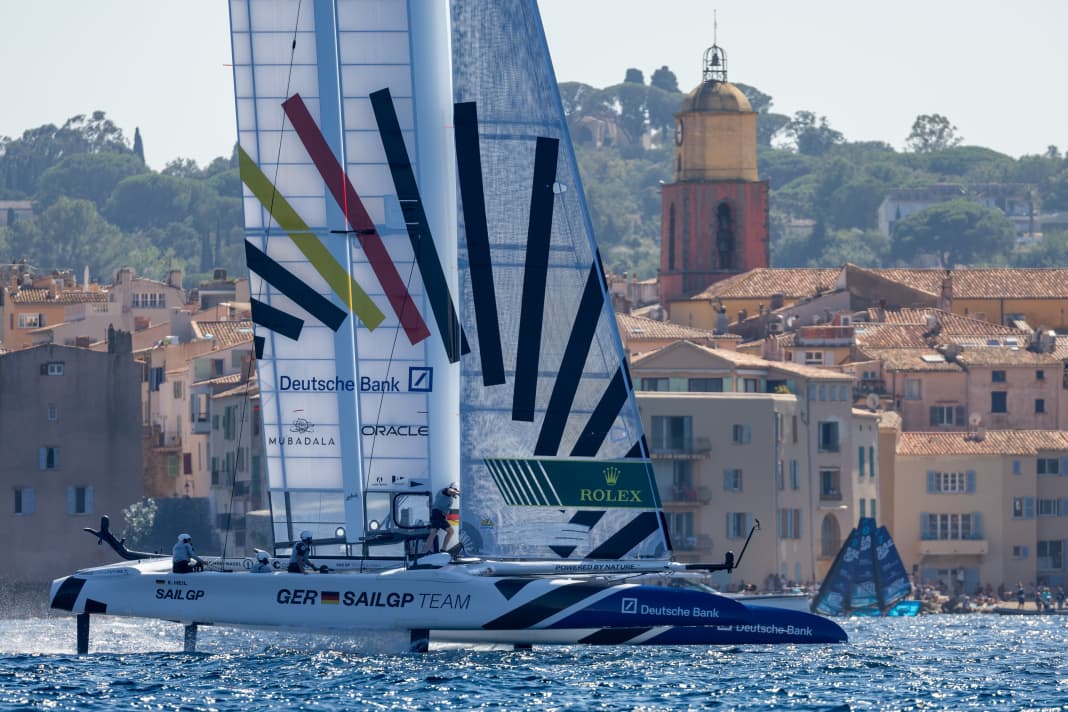





The Germany SailGP Team finished the third regatta of the 2023/2024 season in Saint-Tropez on an upward trend. The German newcomers around helmsman Erik Heil from Strande finished fourth in the last of the five fleet races on Sunday. However, the Germany SailGP team of co-owners Thomas Riedel and four-time Formula 1 world champion Sebastian Vettel is still in tenth and last place in the overall standings ahead of the nine remaining regattas, as the newcomers were recently deducted penalty points in Los Angeles following a collision.
We already have good moments" (Erik Heil)
"We're catching up, slowly but surely. Seventh place here in Saint-Tropez feels good, we couldn't be happier," said Heil. When asked whether his team will be in a position to win races in the leading professional sailing series, which is worth a total of five million dollars, by the end of its debut season, Heil said: "We already have good moments. It's not impossible."
Sir Ben Ainslie's British team Emirates GBR triumphed ahead of Australia and Spain at the SailGP summit on the Côte d'Azur. The most successful Olympic sailor in sporting history with four Olympic gold medals from Great Britain last won a SailGP regatta two and a half years ago and said: "It's been a long time coming. Now it was one of the absolute classics against the Australians, who are a great champion team that we respect a lot. We are happy to accept that we were able to overtake them today."
We almost celebrated. Fortunately, we didn't" (Tom Slingsby)
The Brits achieved victory in spectacular fashion. Although they crossed the start line first with perfect timing, the three-time SailGP season winners from Australia were the first around the first turning mark. In the professional league of speeding F50 catamarans, this is often half the battle for victory. The Australian helmsman Tom Slingsby and his team were then able to defend their lead well. "We led the final five out of six legs. We sailed well and thought we had it. We almost celebrated. Fortunately, we didn't...", Tom Slingsby said later in the harbour.
Because then came the British, who, as expected, created a so-called split at the last goal and did not follow the Australians. "We knew they would do that. No matter which brand we chose: They would take the other one," said Tom Slingsby. He continued: "We wanted to go over to them, but they had 160 degrees of true wind, we had 110 and a 50-degree wind shift. We had no chance. It's a bit frustrating, but we're second here and have ended our negative streak in Saint-Tropez."
Final day without Kiwis - the break as a reminder
The SailGP was visited by Ralf Schumacher on Sunday in Saint-Tropez, who took a look at the technology of the F50 catamarans. Erik Heil explained to the 48-year-old former Formula 1 driver how the high-tech projectiles work with their huge wing sails, which glide over the water on foils at speeds of up to 100 kilometres per hour. The SailGP continues on 23 and 24 September in Taranto, Italy.
The dramatic wing breakage of the New Zealanders will also be remembered from the SailGP in Saint-Tropez. Helmsman Peter Burling and his Kiwis narrowly escaped disaster on the first of the two days of racing when parts of the rig hit the deck, but fortunately the crew narrowly missed. The New Zealand SailGP team had nevertheless been tied on points with the Danish leaders after the first day because the accident occurred after the races. On the final day, the Kiwis were unable to capitalise on their good first day and were forced to watch due to the rig not being repaired overnight.
Seeing such things cautions us not to be too relaxed in our dealings with this infernal machine" (Erik Heil)
"What happened there is really alarming! You could see exactly how the wing broke apart and a ten-metre-long piece of carbon flew onto the cockpit. Seeing things like that reminds us not to be too relaxed when handling this infernal machine," said Erik Heil. At the same time, the 34-year-old realised that he was already able to think and act much more strategically during his third mission. "The more you internalise the processes, the more capacity you gain for other areas. That's good progress," says Heil.
This was particularly evident in the fifth and final race before the final, in which many manoeuvres went well and the average speed of 44.6 kilometres per hour was also the fourth fastest in the field. On the other hand, work continues on the flight time of 80 per cent, as five teams were better in this area. A mixture of mothballing, training on the simulator and a maximum number of outings on the F50 catamarans should help the team continue to improve.
Start-ups remain a high priority
Erik Heil and the team continue to devote around 50 per cent of their training time to optimising their starts. "Our communication has already improved a lot," said the German-Brazilian strategist Kahena Kunze, taking positive stock. The double Olympic champion in the 49er FX said: "It's very exciting to finish in fourth place."

